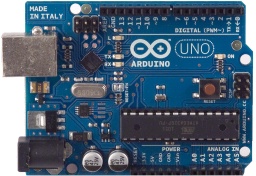 Die Arduino-Plattform ist eine offene Entwicklungsplattform für kleine Hardwareprojekte, inklusive einer Entwicklungsumgebung und verschiedener günstiger Boards wie dem Arduino Uno. Wegen verschiedener Bugs ist die Installation der Entwicklungsumgebung auf einem System mit Fedora 15 leider nicht ganz trivial.
Die Arduino-Plattform ist eine offene Entwicklungsplattform für kleine Hardwareprojekte, inklusive einer Entwicklungsumgebung und verschiedener günstiger Boards wie dem Arduino Uno. Wegen verschiedener Bugs ist die Installation der Entwicklungsumgebung auf einem System mit Fedora 15 leider nicht ganz trivial.
Die notwendigen Pakete befinden sich im Fedora-Repository. Zuerst installieren wir also die Arduino-IDE und stellen die Gruppenrechte her, die zum Zugriff auf die USB-Schnittstelle benötigt werden:
sudo yum install 'arduino*'
sudo usermod -a -G uucp,dialout,lock $USER
Neben der IDE werden der C-Compiler avr-gcc in Version 4.6.1-2 und die avr-libc in Version 1.7.0 installiert. Diese Version des Compilers wirft allerdings nur Fehlermeldungen. Ein Update steht schon bereit, liegt derzeit aber noch in fedora-testing und muss deshalb explizit installiert werden:
sudo yum --enablerepo=updates-testing update 'avr-*'
Danach ist der avr-gcc in Version 4.6.1-3 und die avr-libc in Version 1.7.1 installiert. Die IDE kann nun gestartet und die Sketches können kompiliert werden.
Allerdings bleibt noch ein Problem: durch eine zu aggressive Compiler-Optimierung funktioniert die delay()-Funktion unter Umständen nicht. So leuchtet bei dem Beispiel Blink die Test-LED dauerhaft, statt zu blinken. Die Ursache dafür lässt sich zum Beispiel durch einen Eingriff in eine Datei beheben. Folgender Patch führt diese Änderung aus:
sudo patch -d /usr/share/arduino/hardware/arduino/cores/arduino wiring.c << __END__
25a26
> #include <avr/delay.h>
106c107
< {
---
> {/*
114a116
> */ _delay_ms(ms);
__END__
Danach steht der Experimentierfreude nichts mehr im Wege!

